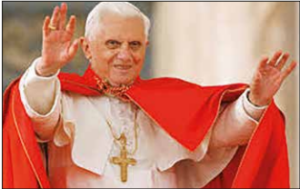Media coverage of Pope Emeritus Benedict has been wide-ranging in the various aspects of his papacy with some very positive reviews and some rather negative ones on some aspects. One thing that all commentators seem to have agreed on is that Benedict was an outstanding theologian, possibly the greatest of his generation. This, however, has often been said almost in passing, as if it was a relatively unimportant aspect of his papacy. On the contrary, it is a rich legacy that he has left the church.
Another area where many seemed to miss an important point is when they compare Benedict to his predecessor and successor. The work of any individual pope cannot simply be contrasted with other individual popes, they must be considered as part of a sequence which is the foundation for the continuing development of the church.
St. John Henry Newman described a threefold aspect to Catholicism saying that it was a philosophy by which he meant the truth in what we believe, a political power by which he meant the government of the church and a religious rite by which he meant the ways in which we worship God and achieve spirituality. Whilst every Pope will concern himself to some degree with all three aspects, he will often make the greatest impact in one particular area. When we look at our most recent three popes, we can see that between them, they have made a particular contribution to all the aspects identified by Newman with Pope John Paul II focusing on the authority of the church, Pope Benedict focusing on the theology and Pope Francis focusing on the pastoral aspect.
Fellow contributor Gráinne Doherty expresses this very succinctly in her concept of the ‘Triptych of Papal Thought’: that Pope John Paul II taught us what to believe; Pope Benedict taught us why we believe it; Pope Francis tells us how to live out what we believe.
I think that in our ongoing Synodal Pathway, it is important that we bear those three aspects in mind. It would be easy to get caught up, for example in the way we treat people or the form of liturgy we practice without taking the other aspects into account.
One of the issues that have come out in the listening part of that Synodal Pathway, both locally and nationally is the need for a greatly improved faith formation for parents and for those exercising various lay ministries within their parishes.
Back in 1997, eight years before he became Pope, writing as Cardinal Ratzinger in ‘Salt of the Earth’, Benedict predicted that our church would become much smaller; she would no longer be able to inhabit many of the edifices built in prosperity; that as the number of her adherents would diminish, she would lose many of her social privileges; as a smaller society, she would make much bigger demands on the initiative of her individual members. That is exactly what has happened and is effectively what we are trying to deal with in the Synodal Pathway. Much of Benedict’s thinking and writing was focused on dealing with the changes he foresaw and I believe his theology could make a major contribution to that formation.
Benedict’s writing, like that of most theologians, can be difficult for lay people to read due to theological jargon and terminology. One of his concepts, for example, that I think can be very relevant to us is that of “hermeneutic continuity”. Despite the difficult-sounding theological terminology, that concept reflects a very simple but very important principle – that changes we make in the church must be a development of what has gone before rather than a departure from it.
For example, the Mass we celebrate today has a very different format from that celebrated by many of us in our younger years; that in turn was very different from the circumstances in which our ancestors celebrated Mass in Penal Times and different again from how early Christians celebrated in the catacombs of Rome. Despite those changes in format and circumstances, our Celebration of the Eucharist as the Sacrifice of Cavalry remains the same from the very beginning until today. It is important that as we look at the possibility of more changes to the liturgy, we do not lose sight of that underlying constancy.
Turning to the quotation from ‘Jesus of Nazareth’ that has fuelled this month’s reflection, Benedict asked–“What did Jesus bring …?” and replied “The answer is very simple: God”, I think again that is something that should underpin everything we do in the Synodal Pathway. As Pope Francis and Bishop Donal have both reminded us, in our listening process, we are not trying to arrive at a solution that only reflects what we think would be best for us as individuals or our personal opinion of what is best for the Church; we are trying instead to discern what God wants for his Church. To me, that is a mirror of the question that Benedict posed except that instead of asking “What did Jesus bring?”, we should perhaps ask ourselves “What can I bring to Jesus?”


Leave a Reply